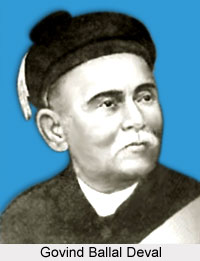 Govind Ballal Deval was considered as the father of Marathi social theatre. He was born in the year of 1855 at Haripur in Sangli district. His father worked for the Sangli princely state, his elder brother was a music scholar, and another brother was a famous actor in the Ichalkaranjikar Natak Mandali. He studied at Kolhapur and Belgaum in Karnataka up to his matriculation in 1878. Then he was introduced to `Annasaheb` Kirloskar. He completed a course in agriculture from the Engineering College, Pune, but raised in an atmosphere charged with theatre, he devoted his entire life to it, though he taught in schools.
Govind Ballal Deval was considered as the father of Marathi social theatre. He was born in the year of 1855 at Haripur in Sangli district. His father worked for the Sangli princely state, his elder brother was a music scholar, and another brother was a famous actor in the Ichalkaranjikar Natak Mandali. He studied at Kolhapur and Belgaum in Karnataka up to his matriculation in 1878. Then he was introduced to `Annasaheb` Kirloskar. He completed a course in agriculture from the Engineering College, Pune, but raised in an atmosphere charged with theatre, he devoted his entire life to it, though he taught in schools.
At the time he was in Pune he founded a company called Aryoddharak to give a new direction to Marathi theatre. He assisted in the productions of Bhatta Narayana`s Venisamhar and Ajit Singh, based on Mahadevshastri Kolhatkar`s translation of Shakespeare`s Othello. When the Kirloskar Natak Mandali was established in 1880, he joined it as lyricist and "rehearsal master". His disciples included Bhaurao Kolhatkar, Nanasaheb Joglekar, Ganesh Bodas, Kashinathpant Parchure, and Bal Gandharva. He adapted six plays. The names can be mentioned as Durga in 1886, based partly on Thomas Southerne`s The Fatal Marriage, Mrichchhakatik in 1887 and Vikramorvashiya in 1889, from Sudraka and Kalidasa respectively, Jhunjarrao in 1890, from Shakespeare`s Othello, Phalgunmo, later revised as Samshaykallol i.e. "Havoc of Suspicion" in 1893, based partly on Moliere`s Sganarelle, and Shapa sambhram i.e. "Confusion of the Curse" in 1893, from Banabhatta`s Kadambart. Deval`s last and only original drama, Sharada in 1899, won great popular and critical acclaim for his presentation of the inhuman custom of marrying or selling off young girls to old men. When the British administration finally stopped this practice in 1929, it named the legislation the Age of Consent or Sarada Act. This was an index of the play`s influence. His works have authentic atmosphere, lively characterization, witty dialogue, and easy songs set to melodious music by Deval himself. Vikramorvashiya, Shapa sambhram, and Sharada were among Kirloskar Natak Mandali`s most popular productions. As a matter of fact it can be said that Govind Ballal Deval was a leading figure in Marathi Sangeet Natak for three decades. This legendary figure died in 1916.




















